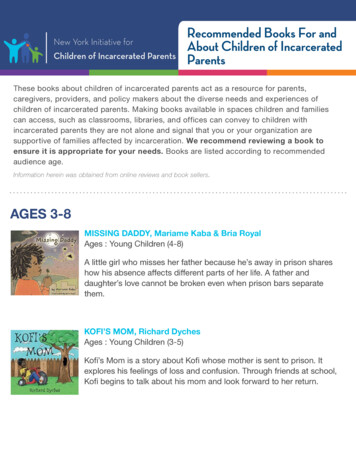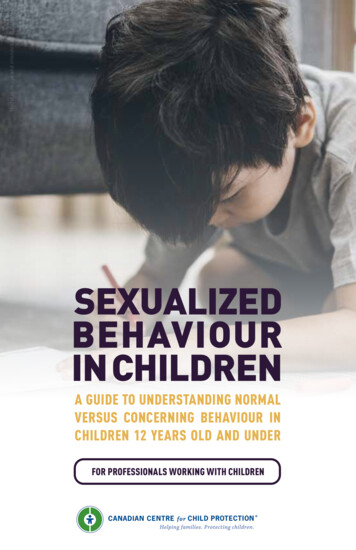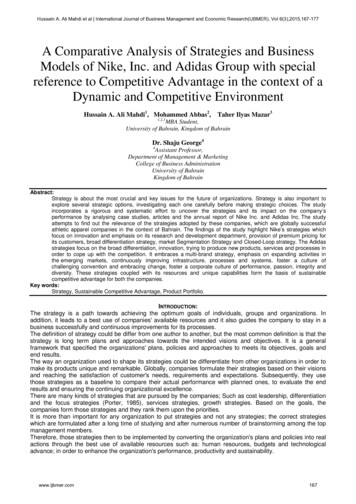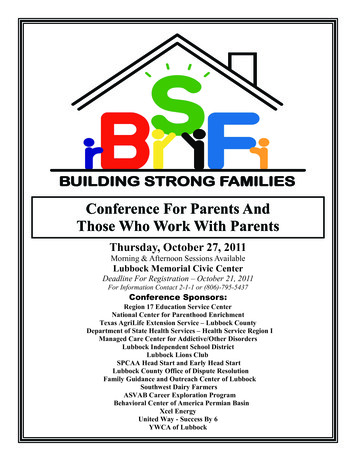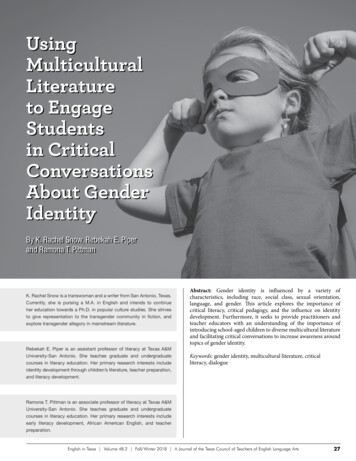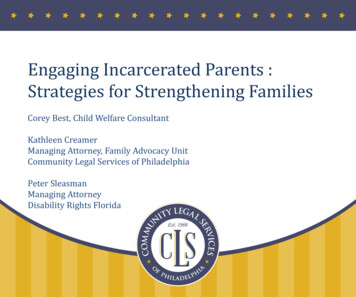
Transcription
Engaging Incarcerated Parents :Strategies for Strengthening FamiliesCorey Best, Child Welfare ConsultantKathleen CreamerManaging Attorney, Family Advocacy UnitCommunity Legal Services of PhiladelphiaPeter SleasmanManaging AttorneyDisability Rights Florida
OVERVIEW Family Engagement/Why Engage? Video 5 Myths About Children of IncarceratedParents Overview of Law Strategies What You Can Do Today
Why Engage Incarcerated Parents What is Your Definition of Parent/FamilyEngagement? Why Is Engagement of Incarcerated ParentsImportant? Why Is Quality Parent Engagement Good forKids? What Values are Needed to Honor the Role ofIncarcerated Parents?
Video: Echoes of Incarcerationhttps://www.youtube.com/watch?v B4VZRs3E1N0
5 Myths aboutChildren of IncarceratedParents
5 MYTHSMyth #1:Children of incarcerated parents are six timesmore likely than the average child to go to prisonthemselves
5 MYTHS There is no research to support thisproposition In fact, existing research suggests that a largemajority of children of incarcerated parentsdo not become justice-involved Repeating this myth compounds the shameand stigma children of incarceratedparents feel
5 MYTHSMyth #2Most children of incarcerated parents have norelationship with their incarcerated parent
5 MYTHS Almost half of all incarcerated parents livedwith their children prior to their arrest 64% of mothers 47% of fathers Mothers are a fast-growing population: From1991-2007, the number of children with amother in prison increased by 131%
5 MYTHSMyth #3Incarcerated Parents are Dangerous People
5 MYTHS A very small minority of parents areincarcerated for crimes against children Most parents are incarcerated for non-violentcrimes 71% of mothers are nonviolent offenders 52% of fathers are nonviolent offenders
5 MYTHSMyth #4Prison Visitation is Damaging to Children
5 MYTHS Children of incarcerated parents experience traumaand loss characterized by feelings of grief, shameand isolation Visitation can help a child’s emotional adjustmentand behavior When the incarcerated parent was the primarycaregiver, visiting is especially crucial toaddressing the trauma of separation
5 MYTHSMyth #5Parents Can’t Play an Important Role in theirChild’s Life from Jail
5 MYTHS Incarcerated parents can be valuable partnersto the caregiver and offer love and support tothe child during incarceration Engagement of the incarcerated parent oftenproduces positive outcomes for children Involving incarcerated parents in decisionmaking can make the reentry andreunification process smoother forchildren and parents.
Overview of the Law
Case PlanningNew Law Effective July 1: F.S.A. § 39.6021 requires that incarcerated parents be included incase planning; that the agency make efforts to receive informationfrom the prison facility on how to include the parentin case planning; that the agency obtain information about howparents can participate in services at the facility; that should a parent become incarcerated, theparties move to amend the case plan toaccommodate the changed conditions; and that if the parent cannot participate, thedepartment will explain the circumstances thatprevented such participation.
Case PlanningSee also In re J.L., 15 So. 3d 866, 869 (Fla. Dist. Ct. App.2009). (Reversing termination of parental rights becausethe incarcerated father had never received a copy of thecase plan and the case managers made no efforts to assisthim in complying with it.)
Visiting/Family TimeKeeping Children Safe Act. See F.S.A. § 39.0139. Rebuttablepresumption that contact between a parent or caregiverand a child would be to the child’s detriment if the parent: Sexually abused the child (probable cause standard) Has been found guilty of: Removing/concealing minors Sexual battery Lewd/lascivious behavior Incest Abuse Is a sexual predatorNote: There is no reason to believe this is likely to apply tomost incarcerated parents
Reasonable Efforts“Reasonable effort” means the exercise ofreasonable diligence and care by thedepartment to provide the servicesordered by the court or delineated in thecase plan.Fla. Stat. Ann. § 39.521No specific definition for incarceratedparents, but new case planning statuteand federal law offers guidance
Reasonable EffortsReasonable Efforts Should Include: Engagement of incarcerated parent through caseworkervisits or other contact Identifying relatives who may be a resource for the child Encouraging and facilitating parent-contact Working to preserve the parent-child relationship Involving the parent in case planning for the childSource: Federal Interagency Reentry Council
Reasonable EffortsAggravated circumstances:Reasonable efforts to reunify arenot required if the court finds thatany of the acts listed in s.39.806(1)(f)-(l) have occurred.Fla. Stat. Ann. § 39.521
Termination of Parental RightsF.S.A. § 39.806(d): Parental Incarceration GroundsIncarceration may be grounds for terminating parental rights if oneof three conditions is also satisfied: “The period of time for which the parent is expected to beincarcerated will constitute a significant portion of the child'sminority,” the parent has been found guilty under certain enumeratedcriminal statutes or “substantially similar offenses” in anotherjurisdiction, OR “[t]he court determines by clear and convincing evidence thatcontinuing the parental relationship with the incarcerated parentwould be harmful to the child,” after weighing certain specifiedfactors, see F.S.A. § 39.806(d)(3).Note: This is also a ground for aggravated circumstancesunder 806(2)
Termination of Parental RightsF.S.A. § 39.806(b): Abandonment Grounds A parent’s incarceration may be considered a factor interminating parental rights on the basis ofabandonment, as defined by F.S.A. § 39.01(1). Incarceration alone is not sufficient proveabandonment for the purposes of terminating parentalrights. See B.F. v. State, Dep't of Children & Families, 237So. 3d 390, 393 (Fla. Dist. Ct. App. 2018).Note: this is also a ground for aggravated circumstancesunder 806(2)
Strategies/Nuts & Bolts
LOCATING AN INMATEVINELINK.COM(any state or local facility)Florida Department of Corrections“Offender Information Search.aspx
Florida Department of CorrectionsFlorida Department of Corrections (FDC) Over 90,000 inmates in prisons 50 Correctional Institutions 7 Private Prisons: “Correctional Facilities” Many more work camps, work release centers,and re-entry centers
Florida Department of CorrectionsInstitutional Placement33-601.210, FAC. After completing the orientation process at a reception center, inmatesare transferred to a “permanent facility”. An inmate shall be assigned to a facility that can provide appropriatesecurity and supervision, that can meet the health needs of the inmateas identified by the department’s health services staff, and, to theextent possible, can meet the inmate’s need for programs and isnear the location of the inmate’s family. Inmates may request a transfer from their Classification Officer afterthey have been at an institution for a significant amount of time withproper institutional adjustment.
Florida Department of CorrectionsProgrammingFDC provides some academic education, career and technicaleducation, substance abuse, and life skills programs.Some institutions also have additional “faith and characterbased” programs that often include family or parenting skills.The available programs vary significantly by institution. Accessto programs of any kind may be very limited or there may bewaiting lists.Institution information with available programs is on the FDCwebsite: rogram availability should be confirmed with theclassification officer.
Florida Department of CorrectionsProgramming Example: Homestead CI (Female Inmates)Academic Programs:Adult Basic Education; General Educational Development (GED); Literacy ProgramVocational Programs:Automotive Service Technology; PC Support ServicesSubstance Abuse Programs: None at this time.Chaplaincy Services:Chapel Library Program; Kairos Week-ends; Religious Education; Worship ServicesInstitutional Betterment Programs:100-hour Transition Program; AA/NA; Aerobics; Alternatives to ViolenceAM/PM Walking; Anger Management; Art; Music; Creative Writing; Dancing Inside/Out; FamilyDevelopment I & II; Softball Teams; God Behind Bars; Hannah’s Gift; Law Library Program; LibraryProgram; Life Skills; Parenting; Pre-Release Counseling; Spanish;Active and Passive Sports; Wellness Education; YogaRe-Entry Programs:Upper Room Parenting & Financial Preparation; Houses of Healing; Emotions;AA/NA; Drug Awareness; Purpose Driven; Self-Esteem; Human Relations;Celebrate Recovery; Spanish Worship; Spanish Religious Studies
Florida Department of CorrectionsVisitation FDC states visitation is a “privilege and not a right.” 33601.714, FAC. Inmates are only able to receive regularly scheduled visitsfrom people on their approved visitors list. No more thanfifteen people, twelve years of age or older, including familyand non-family members, are allowed on an inmate’sapproved visiting list. 33-601.716, FAC Visitation is regularly scheduled for Saturdays and Sundaysand most holidays. Visitation may be restricted for individual inmates for avariety of reason including disciplinary reports.
Florida Department of CorrectionsVisitation with Children Minor children must be accompanied by a parent or by an approved visitoreighteen years or older who has notarized authorization to escort a minorand represent the minor’s parent or legal guardian 33-601.713, FAC At most institutions visitation areas have “games, small toys and othersuitable activities that are available for small children to assist visitors withkeeping their children occupied during visitation.” 33-601.721, FAC. Parents who have a current or prior sex offense of child abuse convictioncannot visit with a person younger than 17 without obtaining priorpermission from the institution Warden.33-601.720, FAC. Parents are not permitted to visit with minors who arevictims of their offenses unless a family court makes thedetermination that the visitation is necessary. 33-601.720
Florida Department of CorrectionsTelephone and Mail Parents are allowed to place collect calls. to people on theirapproved list. 33-602.205, FAC. All telephone calls are subject to being recorded and/orelectronically monitored. Parents may send and receive routine mail. 33-210.101,FAC. Incoming and outgoing routine mail may be opened andread by prison officials.
CAREGIVER RESOURCES Sesame Street Incarceration ceration Osborne Association: See Us, Support Ushttp://www.osborneny.org/about/susu/ Children of Incarcerated Parents Partnershiphttp://www.sfcipp.org/ National Resource Center on Children and Familiesof the Incarceratedhttps://nrccfi.camden.rutgers.edu/
What You Can Do Today
What You Can Do TodayJudges and Hearing Officers Appoint counsel for incarcerated parents Order the parent to appear at every hearing Ensure the Agency is providing reasonable efforts tothe incarcerated parent Order visits and other parent/child contact, unlessthere is a documented reason it is not in the child’sbest interests
What You Can Do TodayCase Workers Locate and initiate contact with incarcerated parents Include the parent in the development of the caseplan and share information about the child with theparent Support regular parent/child visits and other formsof contact Ensure the child and caregiver have resources (suchas Sesame Street toolkit) to deal with the uniquechallenges of parental incarceration
What You Can Do TodayParent Attorneys Ensure that your client is brought to court for everyhearing Review with the incarcerated parents her rights andresponsibilities and the ASFA timeframe Advocate at court hearings for regular contact andvisitation Encourage your client to participate in prisonprogramming and stay in touch with her child andher caseworker
What You Can Do TodayChild Attorneys/CASA Discuss with your client whether she would like tovisit with her incarcerated parent, and advocate forher wishes Explain to the child what might take place atvisitation Follow up after visitation to address any concerns ofthe child or the caregiver Actively participate in case planning to develop aplan to strengthen the family and supportthe case plan goal
What You Can Do TodayCourt Improvement/System Changes Create/foster a dialogue and inter-agency collaborationbetween child welfare and corrections officials Create and support trainings for child welfare andcorrections Develop informational materials for incarcerated parentsand caregivers Develop uniform protocols and practices for engagingincarcerated parents Support improvements in visitingconditions Collect data
What You Can Do Today
Concluding Remarks
Mothers are a fast-growing population: From 1991-2007, the number of children with a . Parents Can't Play an Important Role in their Child's Life from Jail. 5 MYTHS Incarcerated parents can be valuable partners to the caregiver and offer love and support to the child during incarceration Engagement of the incarcerated parent often .

